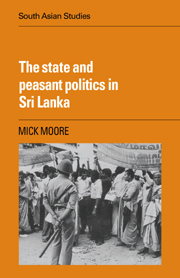Book contents
- Frontmatter
- Contents
- List of maps
- List of tables
- Acknowledgments
- Glossary of Sri Lankan terms
- Maps
- 1 Puzzles and agendas
- 2 Methods, scope and elaborations
- 3 Crown lands
- 4 Land reform
- 5 Pricing and agricultural services
- 6 Categorising space: urban–rural and core–periphery
- 7 A smallholder interest or smallholder interests?
- 8 Rural consciousness
- 9 Ethnic conflict and the politics of the periphery
- 10 The Sri Lankan polity
- 11 Concluding remarks
- Appendix 1 Results of general elections, 1947–77: percentage of parliamentary seats won
- Appendix 2 The myth of the plantation impact on the Sinhalese village: two accounts
- Notes
- Bibliography
- Index
- CAMBRIDGE SOUTH ASIAN STUDIES
7 - A smallholder interest or smallholder interests?
Published online by Cambridge University Press: 05 March 2012
- Frontmatter
- Contents
- List of maps
- List of tables
- Acknowledgments
- Glossary of Sri Lankan terms
- Maps
- 1 Puzzles and agendas
- 2 Methods, scope and elaborations
- 3 Crown lands
- 4 Land reform
- 5 Pricing and agricultural services
- 6 Categorising space: urban–rural and core–periphery
- 7 A smallholder interest or smallholder interests?
- 8 Rural consciousness
- 9 Ethnic conflict and the politics of the periphery
- 10 The Sri Lankan polity
- 11 Concluding remarks
- Appendix 1 Results of general elections, 1947–77: percentage of parliamentary seats won
- Appendix 2 The myth of the plantation impact on the Sinhalese village: two accounts
- Notes
- Bibliography
- Index
- CAMBRIDGE SOUTH ASIAN STUDIES
Summary
Introduction
At this point the analytic focus of the book shifts. In Chapters Three to Five we were concerned with the observable politics behind rural policy over the past half century or so: the policies pursued in the spheres of Crown land alienation, land tenure reform, agricultural pricing and agricultural service provision, and the factors shaping these policies. The intention was to justify the insistence on the political subalternity of the smallholder population: its general dependence on the elite for political initiatives, and the common failure of these initiatives to articulate and incorporate the kinds of demands and policies which would appear to represent the true interests of the smallholders themselves. Chapter Six represented a kind of interlude: the introduction of the core–periphery continuum as a tool of analysis to be used in this and later chapters. At this point we begin to focus directly on resolving the puzzle set out at the beginning of the book: why has peasant subalternity been characteristic of Sri Lankan politics despite certain expectations to the contrary?
There are a number of dimensions to the answer. We begin in this chapter by examining how far Sri Lankan smallholders have – and are likely to perceive themselves to have – a common interest in relation to agricultural policy. Is there, within the realm of feasible agricultural policies, a viable basis for an agrarian programme which would attract widespread rural electoral support?
- Type
- Chapter
- Information
- The State and Peasant Politics in Sri Lanka , pp. 141 - 166Publisher: Cambridge University PressPrint publication year: 1985



